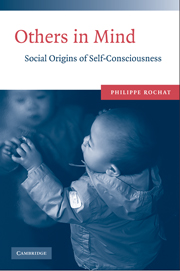Book contents
- Frontmatter
- Contents
- Foreword by Jerôme Bruner
- Preface
- Introduction: Main Ideas
- 1 Self-Conscious Species
- 2 Six Propositions
- 3 Varieties of Self-Reflective Mind State
- 4 Mind States in Development
- 5 Birth of Self-Consciousness
- 6 Shame and Self-Knowledge
- 7 The Roots of Guilt
- 8 Giving and Sharing
- 9 Origins of Owning and Sharing
- 10 Social Construction of Identity
- Conclusion: Moral Space and the Self
- Postscript Note
- References
- Index
Foreword by Jerôme Bruner
Published online by Cambridge University Press: 05 August 2012
- Frontmatter
- Contents
- Foreword by Jerôme Bruner
- Preface
- Introduction: Main Ideas
- 1 Self-Conscious Species
- 2 Six Propositions
- 3 Varieties of Self-Reflective Mind State
- 4 Mind States in Development
- 5 Birth of Self-Consciousness
- 6 Shame and Self-Knowledge
- 7 The Roots of Guilt
- 8 Giving and Sharing
- 9 Origins of Owning and Sharing
- 10 Social Construction of Identity
- Conclusion: Moral Space and the Self
- Postscript Note
- References
- Index
Summary
This is an astonishing book, astonishing both in its range and in what it seeks to make clear. Its central concern is with the nature and origins of selfhood, a distinctively human phenomenon. Its rather contrarian view is that Selfhood emerges as a product of inevitable uncertainties about our acceptance by the larger group or, more broadly, as a product of our doubts about how Others see us. Self, in a word, is then a joint project, Cogitamus, ergo sum, rather than the simplex Cartesian Cogito, ergo sum. Selfhood is not just a product of inner processes but it expresses the outcome of real or imagined exchanges with Others.
This is a book of astonishing breadth, for Philippe Rochat explores not only different forms of self-awareness, but also the varied settings in which such self-awareness may be evoked. And in the process he leans upon evidence from his own well-known experimental studies of young children, evidence from linguistic theory itself, and evidence from comparative cultural studies of peoples around the world. For him, the evidence is overwhelmingly, “Without others, there is no self-consciousness.”
Indeed, it is this other-related nature of self-awareness, with its accompanying fear of rejection, that creates the compelling dynamic of shame that is so much a feature of human awareness. It seems an odd way of putting it, but for Rochat selfhood is as much if not more a human distress maker as a distress dispeller (as it is in Freudian thinking).
- Type
- Chapter
- Information
- Others in MindSocial Origins of Self-Consciousness, pp. vii - viiiPublisher: Cambridge University PressPrint publication year: 2009



